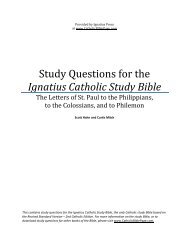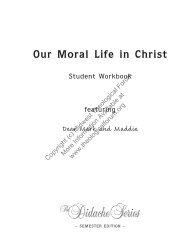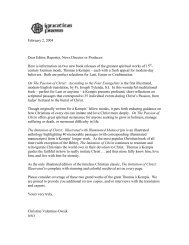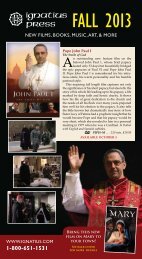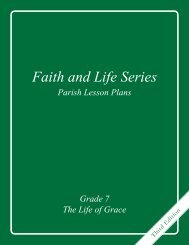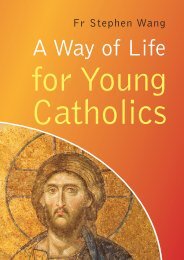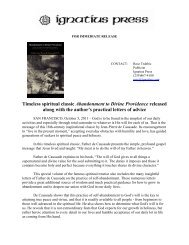Divine Mercy Prayer Book - Ignatius Press
Divine Mercy Prayer Book - Ignatius Press
Divine Mercy Prayer Book - Ignatius Press
You also want an ePaper? Increase the reach of your titles
YUMPU automatically turns print PDFs into web optimized ePapers that Google loves.
27<br />
Congregation for <strong>Divine</strong> Worship and the Discipline of the<br />
Sacraments, the name of this liturgical day has been<br />
changed to: Second Sunday of Easter, or <strong>Divine</strong> <strong>Mercy</strong><br />
Sunday. Pope John Paul II made the surprise<br />
announcement of this change in his homily at the<br />
canonisation of St Faustina on 30th April, 2000. There, he<br />
declared: “It is important then that we accept the whole<br />
message that comes to us from the word of God on this<br />
Second Sunday of Easter, which from now on throughout<br />
the Church, will be called ‘<strong>Divine</strong> <strong>Mercy</strong> Sunday.’”<br />
By the words “the whole message,” Pope John Paul II<br />
was referring to the connection between the “Easter<br />
Mystery of the Redemption” - in other words, the<br />
suffering, death, burial, resurrection, and ascension of<br />
Christ, followed by the sending of the Holy Spirit - and this<br />
Feast of <strong>Divine</strong> <strong>Mercy</strong>, the Octave Day of Easter, which<br />
fulfils the grace of atonement as lived through by Christ<br />
Jesus and offered to all who come to Him with trust.<br />
Clearly, <strong>Divine</strong> <strong>Mercy</strong> Sunday is not a new feast<br />
established to celebrate St Faustina’s revelations. Indeed, it<br />
is not primarily about St Faustina at all - nor is it altogether<br />
a new feast! The title “<strong>Divine</strong> <strong>Mercy</strong> Sunday” does<br />
highlight and amplify the meaning of the day. In this way, it<br />
recovers an ancient liturgical tradition, reflected in a<br />
teaching attributed to St Augustine about the Easter Octave,<br />
which he called “the days of mercy and pardon,” and the<br />
Octave Day itself “the compendium of the days of mercy.”




